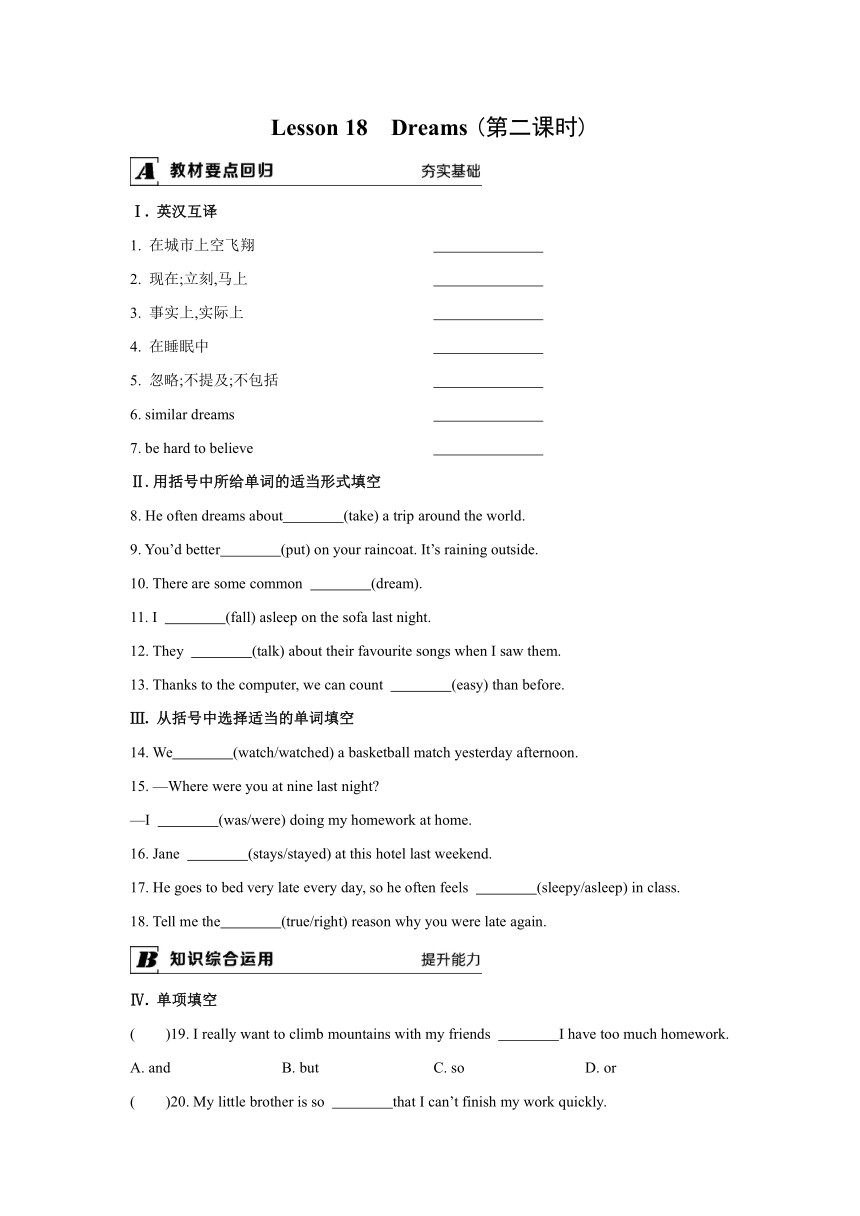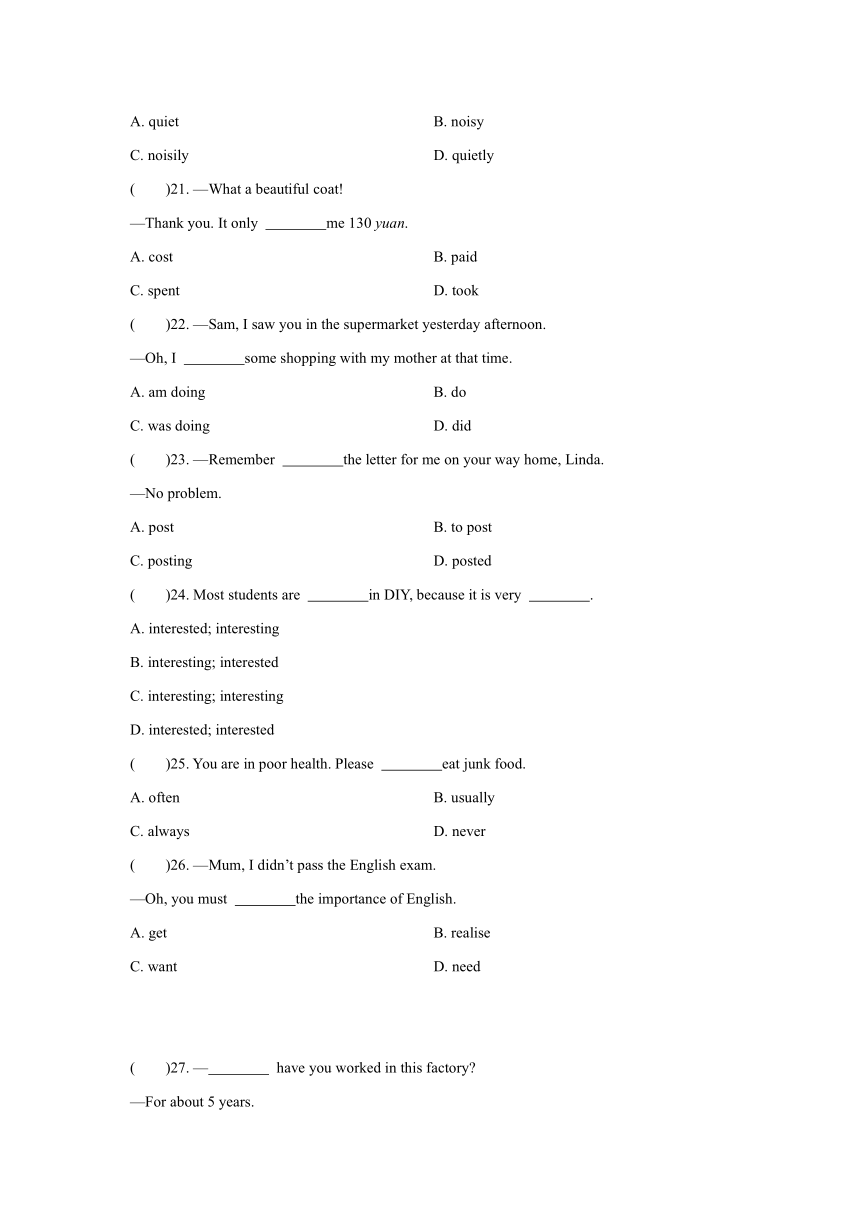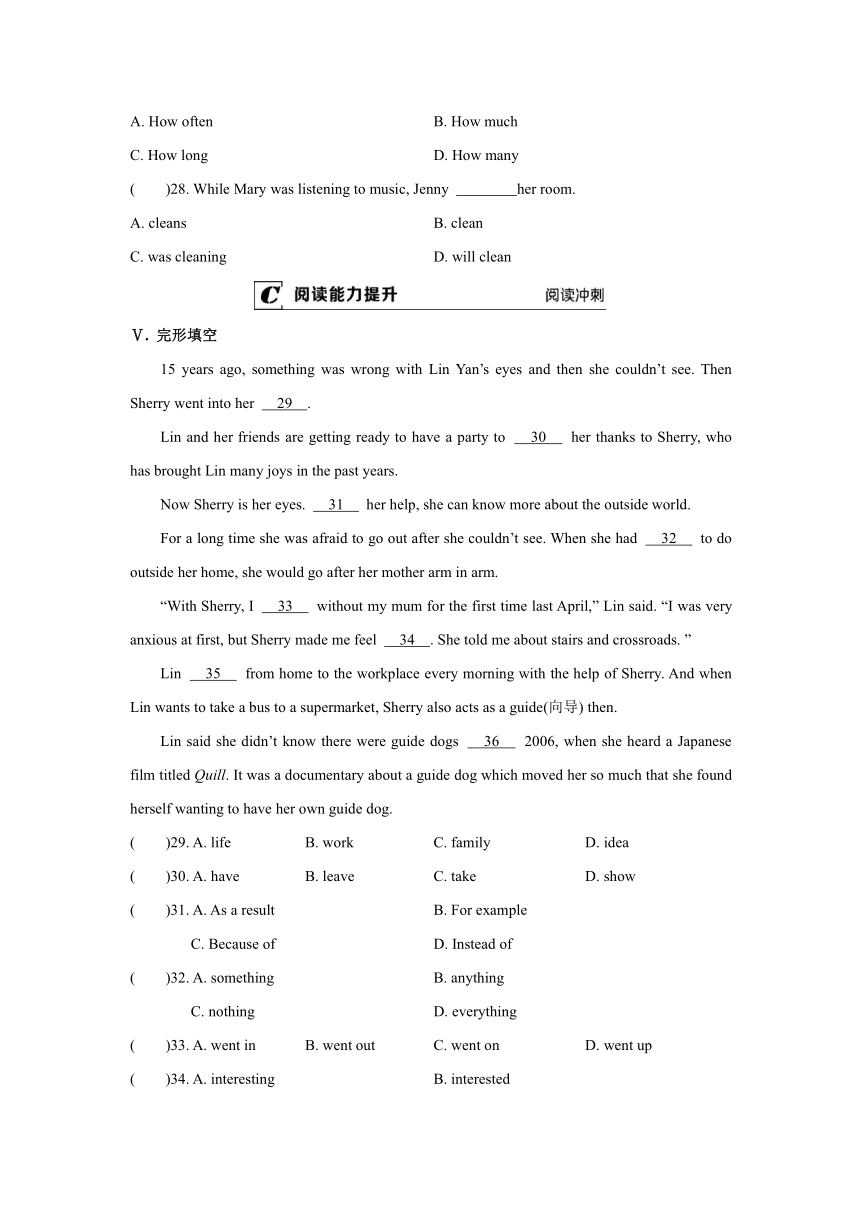北师大版英语八年级上册同步课时训练:Unit 6 Lesson 18 Dreams (第二课时)(含答案)
文档属性
| 名称 | 北师大版英语八年级上册同步课时训练:Unit 6 Lesson 18 Dreams (第二课时)(含答案) |  | |
| 格式 | docx | ||
| 文件大小 | 94.9KB | ||
| 资源类型 | 教案 | ||
| 版本资源 | 北师大版 | ||
| 科目 | 英语 | ||
| 更新时间 | 2022-04-07 21:55:57 | ||
图片预览



文档简介
Lesson 18 Dreams (第二课时)
Ⅰ. 英汉互译
1. 在城市上空飞翔
2. 现在;立刻,马上
3. 事实上,实际上
4. 在睡眠中
5. 忽略;不提及;不包括
6. similar dreams
7. be hard to believe
Ⅱ.用括号中所给单词的适当形式填空
8. He often dreams about (take) a trip around the world.
9. You’d better (put) on your raincoat. It’s raining outside.
10. There are some common (dream).
11. I (fall) asleep on the sofa last night.
12. They (talk) about their favourite songs when I saw them.
13. Thanks to the computer, we can count (easy) than before.
Ⅲ. 从括号中选择适当的单词填空
14. We (watch/watched) a basketball match yesterday afternoon.
15. —Where were you at nine last night
—I (was/were) doing my homework at home.
16. Jane (stays/stayed) at this hotel last weekend.
17. He goes to bed very late every day, so he often feels (sleepy/asleep) in class.
18. Tell me the (true/right) reason why you were late again.
Ⅳ. 单项填空
( )19. I really want to climb mountains with my friends I have too much homework.
A. and B. but C. so D. or
( )20. My little brother is so that I can’t finish my work quickly.
A. quiet B. noisy
C. noisily D. quietly
( )21. —What a beautiful coat!
—Thank you. It only me 130 yuan.
A. cost B. paid
C. spent D. took
( )22. —Sam, I saw you in the supermarket yesterday afternoon.
—Oh, I some shopping with my mother at that time.
A. am doing B. do
C. was doing D. did
( )23. —Remember the letter for me on your way home, Linda.
—No problem.
A. post B. to post
C. posting D. posted
( )24. Most students are in DIY, because it is very .
A. interested; interesting
B. interesting; interested
C. interesting; interesting
D. interested; interested
( )25. You are in poor health. Please eat junk food.
A. often B. usually
C. always D. never
( )26. —Mum, I didn’t pass the English exam.
—Oh, you must the importance of English.
A. get B. realise
C. want D. need
( )27. — have you worked in this factory
—For about 5 years.
A. How often B. How much
C. How long D. How many
( )28. While Mary was listening to music, Jenny her room.
A. cleans B. clean
C. was cleaning D. will clean
Ⅴ. 完形填空
15 years ago, something was wrong with Lin Yan’s eyes and then she couldn’t see. Then Sherry went into her 29 .
Lin and her friends are getting ready to have a party to 30 her thanks to Sherry, who has brought Lin many joys in the past years.
Now Sherry is her eyes. 31 her help, she can know more about the outside world.
For a long time she was afraid to go out after she couldn’t see. When she had 32 to do outside her home, she would go after her mother arm in arm.
“With Sherry, I 33 without my mum for the first time last April,” Lin said. “I was very anxious at first, but Sherry made me feel 34 . She told me about stairs and crossroads. ”
Lin 35 from home to the workplace every morning with the help of Sherry. And when Lin wants to take a bus to a supermarket, Sherry also acts as a guide(向导) then.
Lin said she didn’t know there were guide dogs 36 2006, when she heard a Japanese film titled Quill. It was a documentary about a guide dog which moved her so much that she found herself wanting to have her own guide dog.
( )29. A. life B. work C. family D. idea
( )30. A. have B. leave C. take D. show
( )31. A. As a result B. For example
C. Because of D. Instead of
( )32. A. something B. anything
C. nothing D. everything
( )33. A. went in B. went out C. went on D. went up
( )34. A. interesting B. interested
C. relaxed D. relaxing
( )35. A. runs B. walks C. drives D. flies
( )36. A. while B. after C. when D. until
Ⅵ. 阅读理解
A dream is a story that a person “watches” or even takes part in during sleep. Dream events are imaginary, but they are related to real experiences and needs in the dreamer’s life. They seem real while they are happening. Some dreams are pleasant, some are annoying, and others are frightening.
Everyone dreams, but some persons never recall(回忆) dreaming. Others remember only a little about a dream they had just before awakening and nothing about earlier dreams. No one recalls all his dreams.
Dreams involve little logical thought. In most dreams, the dreamer can’t control what happens to him. The story may be confusing, and things happen that would not happen in real life. People see in most dreams, but they may also hear, smell, touch, and taste in their dreams. Most dreams occur in colour, but persons who have been blind since birth do not see at all in dreams.
Dreams are a product of the sleeper’s mind. They include events and feelings that he has experienced. Most dreams are related to events of the day and strong wishes of the dreamer. Many minor incidents of the hours before sleep appear in dreams. Few events more than two days old turn up. Deep wishes or fears, especially those held since childhood, often appear in dreams, and many dreams fulfill(实现) such wishes. Events in the sleeper’s surroundings, a loud noise, for example, may become part of a dream, but they do not cause dreams.
Some dreams involve deep feelings that a person may not realise he has. Psychiatrists(精神科医生) often use material from a patient’s dreams to help the person understand himself better.
Dreaming may help maintain(保持) good learning ability, memory, and emotional adjustment. People who get plenty of sleep—but are awakened each time they begin to dream—become anxious and restless.
( )37. According to the passage, dreams result from .
A. the sleeper’s feelings
B. the sleeper’s wishes
C. the sleeper’s own mind
D. the sleeper’s imagination
( )38. We may infer from the passage that dreaming .
A. disturbs people’s life
B. deprives(剥夺) people of a good sleep
C. makes people always restless
D. is beneficial(有益的) to people
( )39. This passage suggests that psychiatrists are .
A. trying to make the sleeper dream logically
B. offering help to the patients by studying their dreams
C. trying to help the dreamer recall his earlier dreams
D. helping the sleeper fulfill his dreams
( )40. This passage is mainly about .
A. why we dream during sleep
B. how we dream during sleep
C. what dreams are
D. what benefits dreams bring to people
答案
Lesson 18 Dreams (第二课时)
Ⅰ. 1. fly over the city 2. right now
3. in fact 4. during sleep 5. leave out
6. 相似的梦 7. 很难相信
Ⅱ. 8. taking 9. put 10. dreams
11. fell 12. were talking 13. more easily
Ⅲ. 14. watched 15. was 16. stayed
17. sleepy 18. true
Ⅳ. 19. B
20. B so…that…意为“如此……以至于……”;be动词后用形容词。句意:我弟弟如此吵闹,以至于我不能很快地完成工作。
21. A 物作主语,表示“花费某人多少钱”时,用cost。
22. C
23. B remember to do sth意为“记得去做某事”。
24. A 25. D 26. B
27. C 句意:“你在这家工厂工作多长时间了 ”“大约五年了。”答语是一段时间,所以应用how long提问,表示“多长时间”,故选C。
28. C 分析前后语境可知,“听音乐”的动作与“打扫房间”的动作同时发生,结合从句时态可知,此处应用过去进行时。故选C。
Ⅴ. 29. A 30. D 31. C 32. A 33. B
34. C 上文提到“I was very anxious”,下文用but表示转折。由此推断,Sherry使“我”放松。
35. B
36. D not…until意为“直到……才”。句意:直到2006年她听说了一部名为Quill的日本电影,Lin才知道有导盲犬。
Ⅵ. 【主旨大意】 文章介绍了我们为什么会在睡觉时做梦,即梦的产生,还简单介绍了梦的益处和梦对人的影响。
37. C 细节理解题。 根据第四段第一句“Dreams are a product of the sleeper’s mind. ”可知,梦是入睡者的大脑产生的。故选C。
38. D 细节理解题。根据最后一段中的“Dreaming may help maintain good learning ability, memory, and emotional adjustment. ”可知,做梦有助于保持良好的学习能力、 记忆力和情绪适应能力。 故选D。
39. B 40. A
Ⅰ. 英汉互译
1. 在城市上空飞翔
2. 现在;立刻,马上
3. 事实上,实际上
4. 在睡眠中
5. 忽略;不提及;不包括
6. similar dreams
7. be hard to believe
Ⅱ.用括号中所给单词的适当形式填空
8. He often dreams about (take) a trip around the world.
9. You’d better (put) on your raincoat. It’s raining outside.
10. There are some common (dream).
11. I (fall) asleep on the sofa last night.
12. They (talk) about their favourite songs when I saw them.
13. Thanks to the computer, we can count (easy) than before.
Ⅲ. 从括号中选择适当的单词填空
14. We (watch/watched) a basketball match yesterday afternoon.
15. —Where were you at nine last night
—I (was/were) doing my homework at home.
16. Jane (stays/stayed) at this hotel last weekend.
17. He goes to bed very late every day, so he often feels (sleepy/asleep) in class.
18. Tell me the (true/right) reason why you were late again.
Ⅳ. 单项填空
( )19. I really want to climb mountains with my friends I have too much homework.
A. and B. but C. so D. or
( )20. My little brother is so that I can’t finish my work quickly.
A. quiet B. noisy
C. noisily D. quietly
( )21. —What a beautiful coat!
—Thank you. It only me 130 yuan.
A. cost B. paid
C. spent D. took
( )22. —Sam, I saw you in the supermarket yesterday afternoon.
—Oh, I some shopping with my mother at that time.
A. am doing B. do
C. was doing D. did
( )23. —Remember the letter for me on your way home, Linda.
—No problem.
A. post B. to post
C. posting D. posted
( )24. Most students are in DIY, because it is very .
A. interested; interesting
B. interesting; interested
C. interesting; interesting
D. interested; interested
( )25. You are in poor health. Please eat junk food.
A. often B. usually
C. always D. never
( )26. —Mum, I didn’t pass the English exam.
—Oh, you must the importance of English.
A. get B. realise
C. want D. need
( )27. — have you worked in this factory
—For about 5 years.
A. How often B. How much
C. How long D. How many
( )28. While Mary was listening to music, Jenny her room.
A. cleans B. clean
C. was cleaning D. will clean
Ⅴ. 完形填空
15 years ago, something was wrong with Lin Yan’s eyes and then she couldn’t see. Then Sherry went into her 29 .
Lin and her friends are getting ready to have a party to 30 her thanks to Sherry, who has brought Lin many joys in the past years.
Now Sherry is her eyes. 31 her help, she can know more about the outside world.
For a long time she was afraid to go out after she couldn’t see. When she had 32 to do outside her home, she would go after her mother arm in arm.
“With Sherry, I 33 without my mum for the first time last April,” Lin said. “I was very anxious at first, but Sherry made me feel 34 . She told me about stairs and crossroads. ”
Lin 35 from home to the workplace every morning with the help of Sherry. And when Lin wants to take a bus to a supermarket, Sherry also acts as a guide(向导) then.
Lin said she didn’t know there were guide dogs 36 2006, when she heard a Japanese film titled Quill. It was a documentary about a guide dog which moved her so much that she found herself wanting to have her own guide dog.
( )29. A. life B. work C. family D. idea
( )30. A. have B. leave C. take D. show
( )31. A. As a result B. For example
C. Because of D. Instead of
( )32. A. something B. anything
C. nothing D. everything
( )33. A. went in B. went out C. went on D. went up
( )34. A. interesting B. interested
C. relaxed D. relaxing
( )35. A. runs B. walks C. drives D. flies
( )36. A. while B. after C. when D. until
Ⅵ. 阅读理解
A dream is a story that a person “watches” or even takes part in during sleep. Dream events are imaginary, but they are related to real experiences and needs in the dreamer’s life. They seem real while they are happening. Some dreams are pleasant, some are annoying, and others are frightening.
Everyone dreams, but some persons never recall(回忆) dreaming. Others remember only a little about a dream they had just before awakening and nothing about earlier dreams. No one recalls all his dreams.
Dreams involve little logical thought. In most dreams, the dreamer can’t control what happens to him. The story may be confusing, and things happen that would not happen in real life. People see in most dreams, but they may also hear, smell, touch, and taste in their dreams. Most dreams occur in colour, but persons who have been blind since birth do not see at all in dreams.
Dreams are a product of the sleeper’s mind. They include events and feelings that he has experienced. Most dreams are related to events of the day and strong wishes of the dreamer. Many minor incidents of the hours before sleep appear in dreams. Few events more than two days old turn up. Deep wishes or fears, especially those held since childhood, often appear in dreams, and many dreams fulfill(实现) such wishes. Events in the sleeper’s surroundings, a loud noise, for example, may become part of a dream, but they do not cause dreams.
Some dreams involve deep feelings that a person may not realise he has. Psychiatrists(精神科医生) often use material from a patient’s dreams to help the person understand himself better.
Dreaming may help maintain(保持) good learning ability, memory, and emotional adjustment. People who get plenty of sleep—but are awakened each time they begin to dream—become anxious and restless.
( )37. According to the passage, dreams result from .
A. the sleeper’s feelings
B. the sleeper’s wishes
C. the sleeper’s own mind
D. the sleeper’s imagination
( )38. We may infer from the passage that dreaming .
A. disturbs people’s life
B. deprives(剥夺) people of a good sleep
C. makes people always restless
D. is beneficial(有益的) to people
( )39. This passage suggests that psychiatrists are .
A. trying to make the sleeper dream logically
B. offering help to the patients by studying their dreams
C. trying to help the dreamer recall his earlier dreams
D. helping the sleeper fulfill his dreams
( )40. This passage is mainly about .
A. why we dream during sleep
B. how we dream during sleep
C. what dreams are
D. what benefits dreams bring to people
答案
Lesson 18 Dreams (第二课时)
Ⅰ. 1. fly over the city 2. right now
3. in fact 4. during sleep 5. leave out
6. 相似的梦 7. 很难相信
Ⅱ. 8. taking 9. put 10. dreams
11. fell 12. were talking 13. more easily
Ⅲ. 14. watched 15. was 16. stayed
17. sleepy 18. true
Ⅳ. 19. B
20. B so…that…意为“如此……以至于……”;be动词后用形容词。句意:我弟弟如此吵闹,以至于我不能很快地完成工作。
21. A 物作主语,表示“花费某人多少钱”时,用cost。
22. C
23. B remember to do sth意为“记得去做某事”。
24. A 25. D 26. B
27. C 句意:“你在这家工厂工作多长时间了 ”“大约五年了。”答语是一段时间,所以应用how long提问,表示“多长时间”,故选C。
28. C 分析前后语境可知,“听音乐”的动作与“打扫房间”的动作同时发生,结合从句时态可知,此处应用过去进行时。故选C。
Ⅴ. 29. A 30. D 31. C 32. A 33. B
34. C 上文提到“I was very anxious”,下文用but表示转折。由此推断,Sherry使“我”放松。
35. B
36. D not…until意为“直到……才”。句意:直到2006年她听说了一部名为Quill的日本电影,Lin才知道有导盲犬。
Ⅵ. 【主旨大意】 文章介绍了我们为什么会在睡觉时做梦,即梦的产生,还简单介绍了梦的益处和梦对人的影响。
37. C 细节理解题。 根据第四段第一句“Dreams are a product of the sleeper’s mind. ”可知,梦是入睡者的大脑产生的。故选C。
38. D 细节理解题。根据最后一段中的“Dreaming may help maintain good learning ability, memory, and emotional adjustment. ”可知,做梦有助于保持良好的学习能力、 记忆力和情绪适应能力。 故选D。
39. B 40. A
同课章节目录
- Unit 1 Television
- Lesson 1 Last Week on TV
- Lesson 2 An Interview on TV
- Lesson 3 The Big Game
- Communication Workshop
- Unit 2 Teams
- Lesson 4 Class Projects
- Lesson 5 Teamwork
- Lesson 6 A Special Team
- Communication Workshop
- Unit 3 Faster,Higher,Stronge
- Lesson 7 Time to Exercise
- Lesson 8 Olympic Winners
- Lesson 9 Never Give Up!
- Communication Workshop
- Unit 4 Healthy Living
- Lesson 10 Going to the Doctor
- Lesson 11 Health Advice
- Lesson 12 Healthy Bones
- Communication Workshop
- Unit 5 Helping
- Lesson 13 Helping Your Community
- Lesson 14 Helping Each Other
- Lesson 15 A Young Hero
- Communication Workshop
- Unit 6 The Unexplained
- Lesson 16 Natural Abilities
- Lesson 17 True Stories?
- Lesson 18 Dreams
- Communication Workshop
